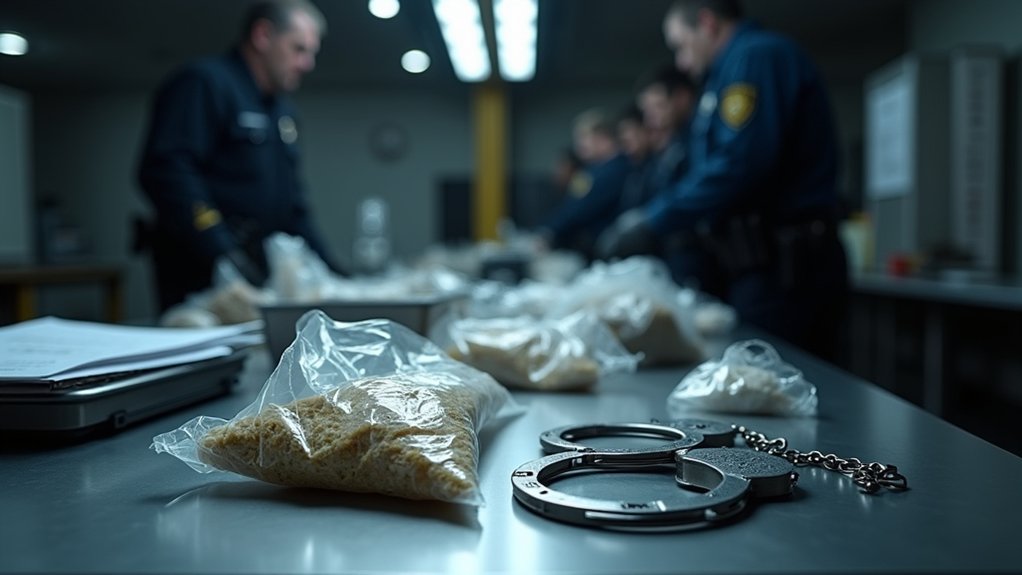A felony possession charge means you’re facing serious legal consequences for unlawful drug control, potentially resulting in 1-25 years imprisonment and $30,000 in fines. Your defense options include challenging evidence admissibility, questioning search warrant validity, exploring procedural errors, and seeking rehabilitation alternatives. Substance schedule, quantity, and jurisdictional variations considerably impact your case. Strategic legal representation can mitigate long-term personal and professional repercussions. The complexities ahead warrant careful navigation.
Understanding Felony Possession Charges

The specter of a felony possession charge looms large in the criminal justice landscape, representing a significant legal threshold that transforms a drug-related offense from a misdemeanor to a more serious criminal classification. You’ll find that these charges hinge on specific criteria, including drug quantity, type, and location of possession. Your case’s complexity revolves around search and seizure protocols and evidence admissibility. Prosecutors must establish your knowing possession through physical proximity, digital communications, or control over the space where drugs were discovered. Different possession types, actual, constructive, or joint, can determine the charge’s trajectory. Prosecutorial intent can significantly influence whether a possession charge escalates to a felony, with careful examination of circumstantial evidence playing a crucial role in legal proceedings. Factors like drug schedule, quantity, and proximity to sensitive areas like schools can elevate a simple possession charge to a felony, potentially carrying substantial prison time and significant financial penalties. Constructive possession evidence can further complicate legal proceedings, requiring prosecutors to demonstrate not just physical proximity but meaningful control over the contraband. First-time offenders may face significant legal challenges and potential long-term consequences related to drug rehabilitation options.
Legal Definitions and Substance Categories
While traversing the complex terrain of drug-related legal classifications, felony possession charges represent a pivotal juncture in criminal law where specific statutory definitions determine potential consequences. You’ll encounter federal schedules classifying controlled substances from Schedule I (highest abuse potential) to Schedule V (lowest risk), with each category carrying distinct legal implications. State-level variations introduce statutory exceptions and nuanced interpretations of controlled substance analogs, further complicating legal assessments. Understanding these classifications is essential, as they directly impact potential imprisonment, with prosecution requiring proof of unlawful possession, knowledge of substance, and existence of a usable quantity. Your defense strategy must meticulously analyze these technical definitions, recognizing how substance schedules and jurisdictional variations can profoundly influence potential legal outcomes. In California, drug possession penalties range from misdemeanor infractions to felony charges, depending on the specific substance and quantity involved. Controlled substance evidence demands rigorous forensic analysis to establish legal culpability and substantiate potential criminal charges. Constructive possession laws enable prosecutors to charge multiple individuals for the same drug, expanding the potential legal exposure for defendants in complex drug-related scenarios.
Threshold Amounts That Trigger Felony Status

Drug possession felony thresholds represent critical legal demarcations where quantity transforms misdemeanor infractions into more serious criminal charges. When facing potential felony classification, you’ll want to understand key factors:
Navigating drug possession thresholds requires understanding how quantity escalates legal consequences from misdemeanor to felony charges.
- Substance-specific quantities: Schedule I drugs often trigger felony status at minimal amounts.
- State-level variations: Thresholds range from ⅛ ounce to multiple grams depending on jurisdiction.
- Potential consequences: Felony classification carries notable legal and personal ramifications.
Recent threshold increases reflect nuanced approaches to public safety impacts. States like Illinois demonstrate sophisticated legal frameworks by distinguishing felony charges based on precise drug quantities. Federal and state laws consistently aim to balance punitive measures with rehabilitative considerations, recognizing that threshold amounts can profoundly influence legal outcomes and potential sentencing strategies. The variation in felony theft thresholds similarly underscores the complex legal landscape surrounding criminal classifications. Drug court programs offer alternative pathways for defendants, potentially mitigating the full impact of felony possession charges by providing rehabilitation-focused interventions. Website security protocols can also impact legal documentation and evidence gathering, potentially influencing case outcomes through careful digital evidence management.
Potential Consequences and Sentencing
When facing a felony possession charge, you’ll confront a complex legal landscape with significant prison time ranging from 1 to 25 years depending on the drug quantity and offense class. Financial penalties can escalate quickly, with potential fines reaching $30,000 and additional court costs that can devastate your economic stability. Beyond immediate legal consequences, a felony conviction carries long-term repercussions including potential loss of professional licenses, voting rights, and substantial barriers to future employment and housing opportunities. Drug treatment court alternatives may provide a pathway for eligible non-violent offenders to pursue rehabilitation instead of traditional sentencing. The severity of penalties increases dramatically for repeat offenders, with enhanced sentencing guidelines potentially doubling the original recommended punishment based on prior convictions. New York drug guidelines specifically outline complex sentencing frameworks for narcotics offenses, with specific considerations for different controlled substances and quantities of possession.
Prison Time Ranges
Felony possession charges in California carry significant prison time ranges that can dramatically alter an individual’s future. Understanding sentencing calculations and parole eligibility is pivotal for anyone facing these charges. California drug diversion programs can potentially offer alternative sentencing options for eligible defendants. Schedule classifications can play a critical role in determining the severity and potential consequences of drug-related criminal charges. Judges often consider rehabilitation potential when determining appropriate sentencing for drug offenses.
Key prison time considerations include:
- Personal Use Possession: 16 months to 3 years
- Possession for Sale: 2, 4 years in state prison
- Drug Trafficking: 3, 9 years, dependent on scale and specifics
Sentencing varies based on multiple factors: drug type, quantity, prior convictions, and aggravating circumstances. Courts assess each case individually, with minimum and maximum terms reflecting offense severity. Enhancements can substantially increase prison time, particularly for repeat offenders or cases involving large drug quantities or proximity to sensitive locations like schools.
Precise legal representation becomes essential in maneuvering these complex sentencing guidelines and potential defense strategies.
Financial Impact Penalties
A single possession charge can trigger a cascade of severe financial consequences that extend far beyond initial court-imposed fines. You’ll face potential asset seizure risks ranging from $5,000 to $100,000 in statutory penalties, with federal charges potentially escalating to $4 million. Beyond direct legal costs, you’ll confront collateral employment consequences that can devastate your economic stability. Professional licenses may be revoked, government financial aid terminated, and job opportunities severely limited. Court-mandated fees for prosecution, probation supervision, and mandatory drug treatment programs will compound your financial strain. Forfeiture actions might seize vehicles, cash, or property connected to the offense, further amplifying economic damage. The long-term financial impact can persist for years, creating substantial barriers to professional and personal recovery. Depending on the degree of possession, such as felony possession levels, fines can escalate dramatically based on the specific substance and quantity involved.
Long-Term Legal Consequences
Beyond the immediate financial burdens, a felony possession charge triggers a complex web of long-term legal ramifications that can fundamentally alter an individual’s life trajectory.
Key consequences include:
- Permanent criminal record impacting future opportunities
- Loss of critical civil rights
- Significant barriers to housing stability and community reintegration
You’ll face extensive legal challenges that extend far beyond initial sentencing. Your conviction results in automatic disqualification from numerous professional and social domains, including employment, housing, and educational opportunities. Courts may mandate supervised probation, drug rehabilitation programs, and impose stringent restrictions on your personal freedoms.
The legal consequences systematically undermine your ability to rebuild your life, creating persistent obstacles in professional licensing, social welfare program eligibility, and personal relationships. Each aspect of your future becomes potentially compromised by a single felony possession charge.
How Felony Charges Differ From Misdemeanors
Criminal charges carry different weight and consequences depending on their classification, with misdemeanors and felonies representing distinct levels of legal severity. Prosecutorial discretion plays an essential role in determining whether a charge becomes a felony or misdemeanor, based on evidence, circumstances, and the defendant’s prior record. The burden of proof remains consistent, but felonies involve more complex legal processes, including potential grand jury indictments and extensive court proceedings. While misdemeanors typically result in county jail sentences under one year, felonies can lead to state prison terms exceeding twelve months. Collateral consequences differ considerably: felony convictions create more substantial long-term barriers to employment, housing, and civil rights, making them significantly more impactful than misdemeanor charges.
Critical Factors Affecting Your Legal Situation

When facing a felony possession charge, understanding the critical factors that shape your legal situation becomes essential to developing an effective defense strategy. Your case’s complexity hinges on multiple variables that can drastically influence potential outcomes.
Key considerations include:
- Drug type and quantity directly impact charge severity and potential plea bargaining opportunities
- Prior criminal history enormously affects sentencing ranges and judicial discretion
- Location of arrest can trigger enhanced penalties, especially in drug-free zones
Mitigating personal circumstances, such as demonstrating rehabilitation efforts or lack of intent to distribute, can potentially reduce charges. Each factor requires meticulous legal analysis to construct a strategic defense approach that addresses the specific nuances of your case and minimizes potential legal consequences.
Strategic Defense Approaches
Maneuvering a felony possession charge necessitates a strategic, multi-layered defense approach that systematically addresses legal vulnerabilities and procedural complexities. You’ll need to explore nuanced strategies like temporary possession arguments, where you demonstrate brief, unintentional control over substances without criminal intent. Challenging the prosecution’s evidence through mistaken identity claims or highlighting procedural errors can critically undermine their case. Your defense might pivot on proving an innocent mistake, such as unknowingly holding drugs in a shared space or lacking direct connection to the controlled substance. Alternative strategies include exposing evidentiary weaknesses, questioning chain of custody documentation, and challenging witness credibility. Diversion programs or rehabilitation alternatives can also provide viable pathways, potentially transforming a potential conviction into a rehabilitative opportunity.
Challenging Evidence and Prosecution Claims
You’ll need to scrutinize the search warrant’s legal foundation and verify its procedural compliance to challenge the prosecution’s evidence. Every detail matters when examining the warrant’s scope, specificity, and judicial authorization, as any technical irregularity could invalidate the subsequent seizure of drug-related evidence. Meticulously analyzing the search warrant’s legitimacy and tracing the evidence’s chain of custody provides critical opportunities to challenge the prosecution’s case and potentially suppress essential evidence.
Search Warrant Legitimacy
Search warrant legitimacy stands as a critical defense strategy that can quickly unravel prosecution claims in felony possession cases. Your defense team will meticulously examine warrant validity through strategic challenges:
- Probable Cause Assessment: Challenging vagueness and insufficient evidence supporting the initial search authorization
- Warrant Scope Limitations: Identifying overly broad warrants that exceed constitutional search protections
- Execution Compliance: Scrutinizing whether law enforcement precisely adhered to warrant specifications
Courts require law enforcement to demonstrate clear, specific connections between criminal activity and searched locations. Material misstatements, unreliable information sources, or imprecise warrant language can render critical evidence inadmissible. By systematically exposing weaknesses in warrant documentation, your defense can challenge the fundamental legality of evidence collection, potentially dismantling the prosecution’s entire case and protecting your constitutional rights against unreasonable searches.
Evidence Chain Integrity
Beyond challenging warrant legitimacy, defendants must systematically scrutinize the prosecution’s evidence through rigorous chain of custody analysis. Your legal defense hinges on identifying potential breaks in the evidence audit trail, where documentation gaps can undermine the prosecution’s claims. Critical examination involves verifying every transfer, storage condition, and handler’s interaction with the evidence. Look for inconsistencies in chronological records, unauthorized access points, or improper handling procedures that might compromise evidence integrity. Each documented transaction becomes a potential vulnerability, and even minor discrepancies can raise reasonable doubt. Forensic science reveals that nearly 29% of DNA exoneration cases stem from evidence mishandling, underscoring the importance of meticulously challenging the chain of custody. Your strategic approach can expose weaknesses that might result in evidence exclusion or case dismissal.
Steps to Protect Your Rights and Future
When facing a felony possession charge, individuals must take strategic, immediate steps to protect their legal rights and future prospects.
Key protective actions include:
- Secure Experienced Legal Representation: Engage a criminal defense attorney specializing in drug offenses to navigate complex legal landscapes and develop robust defense strategies.
- Document Case Details: Meticulously record arrest circumstances, officer interactions, and potential procedural irregularities that could impact case outcomes.
- Address Potential Collateral Consequences: Proactively explore record expungement options and understand long-term implications on professional licensing, employment, and housing opportunities.
Strategic preparation involves thorough documentation, aggressive legal defense, and forward-thinking approaches to mitigate immediate legal challenges and minimize lasting personal and professional repercussions. Understanding your rights and potential defense mechanisms can greatly influence case resolution and future opportunities.
Frequently Asked Questions
Can I Be Charged With Felony Possession if Drugs Aren’t Physically on Me?
Yes, you can be charged with felony possession even without drugs on your person. Constructive possession charges rely on circumstantial evidence proving you knew about the drugs and could control them. Prosecutors must demonstrate both awareness and ability to access the substance through factors like proximity, ownership, and behavioral indicators. Your presence near drugs doesn’t guarantee guilt, but it can support potential charges if compelling evidence exists.
How Quickly Can a Felony Drug Possession Charge Affect My Job?
You can face immediate employment suspension within days of a felony drug possession charge. Employers often initiate termination proceedings as soon as charges are filed, not waiting for a final conviction. Depending on your industry, particularly in healthcare, banking, or federal sectors, you’ll likely experience potential job loss rapidly, with background checks and professional licensing boards triggering swift employment consequences.
Will Mandatory Drug Treatment Programs Help Reduce My Felony Charges?
Mandatory drug treatment programs can help reduce your felony charges if you successfully complete court-ordered rehabilitation. Program completion benefits include potential charge reduction, lower recidivism rates, and decreased likelihood of future arrests. Your compliance and successful treatment graduation could result in charge dismissal or significant sentencing modifications, with documented success rates showing up to 67% reduced probability of returning to prison.
Can Felony Possession Charges Be Sealed or Expunged Later?
You can potentially seal or expunge felony possession charges, but eligibility depends on state laws, offense severity, and your criminal history. Conviction expungement opportunities vary widely, with some jurisdictions allowing record sealing after specific waiting periods. You’ll need to petition the court, demonstrating rehabilitation and meeting jurisdictional requirements. Consult a local attorney to assess your specific case and navigate the complex legal process effectively.
What Happens if I Was Unaware Drugs Were in My Possession?
If you’re facing drug possession charges, you’ll need to prove lack of knowledge through constructive intent considerations. Your defense hinges on demonstrating you were genuinely unaware the drugs were present. The prosecution must prove you knowingly possessed the substances. Presenting evidence of your ignorance can create reasonable doubt, potentially leading to reduced charges or dismissal, depending on specific circumstances and jurisdictional legal standards.

